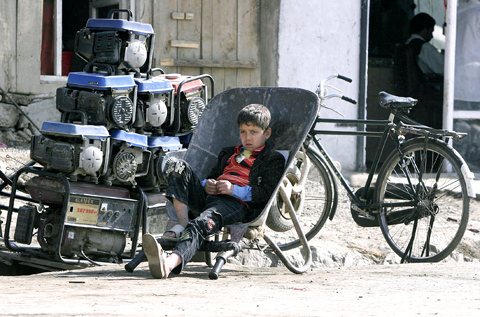Taliban fighters stormed the culture ministry in the heart of Kabul, killing five people in an attack the Afghan president said aimed to derail the government’s new effort to draw militants into a peace process and end a seven-year insurgency.
The fighters shot their way inside the building, where one of the militants blew himself up, a police guard wounded in Thursday’s blast said.
The Taliban claimed responsibility for the attack and gave a similar account.

PHOTO: AP
“Our enemies are trying to undermine the recent efforts by the government for a peaceful solution to end the violence,” US-backed Afghan President Hamid Karzai said in a terse statement.
The attack came three days after senior Afghan and Pakistani officials decided at a meeting held in Pakistan’s capital, Islamabad, to reach out to the Taliban militants to propose talks on ending the insurgency.
The meeting was part of a process initiated in 2006 by US President George W. Bush and his Afghan and Pakistani counterparts.
The Taliban’s former ambassador to Pakistan said the two sides recently had contacts in Saudi Arabia. US Defense Secretary Robert Gates and the incoming head of the US Central Command, General David Petraeus, have both endorsed the efforts.
Karzai’s remarks suggested elements of the Taliban wanted to sabotage the nascent reconciliation efforts.
While the Taliban has regularly used suicide attacks against Afghan and foreign forces around the country, they rarely strike in Kabul.
Amir Mohammad, a police guard who was wounded in Thursday’s attack, said three assailants opened fire on police guards outside the Ministry of Information and Culture before entering its cavernous hall where one of them blew himself up.
“There were three people. They were running. They opened fire on our guard first and then they entered” the building, Mohammad told reporters from his hospital bed in Kabul.
The force of the blast flung Mohammed onto the street, where he lay unconscious among shattered glass and pools of blood.
Five people were killed in the attack, including a policeman, three ministry employees and a civilian, the Interior Ministry said.
An additional 21 were wounded, said Abdul Fahim, the spokesman for the Health Ministry, which supervises the hospitals where the injured were taken.
The culture ministry was a pointed target. Before the US-led invasion toppled the Taliban in late 2001 for sheltering al-Qaeda leader Osama bin Laden, the regime banned art, secular music and television, vandalized the National Museum of Afghanistan and destroyed artwork or statues deemed idolatrous or anti-Muslim.
Taliban fighters also blew up two giant statues of Buddha, cultural treasures that had graced the Silk Road town of Bamiyan for 1,500 years.
Zabiullah Mujahid, a Taliban spokesman, said three militants stormed the building by throwing hand grenades at the guards at the main gate.
A man named Naqibullah from the eastern Khost Province carried out the suicide attack, Mujahid said. The other two men fled, he said.
Though attacks in the capital are rare, on July 7 a suicide attacker killed more than 60 outside the Indian embassy in Kabul.

Kehinde Sanni spends his days smoothing out dents and repainting scratched bumpers in a modest autobody shop in Lagos. He has never left Nigeria, yet he speaks glowingly of Burkina Faso military leader Ibrahim Traore. “Nigeria needs someone like Ibrahim Traore of Burkina Faso. He is doing well for his country,” Sanni said. His admiration is shaped by a steady stream of viral videos, memes and social media posts — many misleading or outright false — portraying Traore as a fearless reformer who defied Western powers and reclaimed his country’s dignity. The Burkinabe strongman swept into power following a coup in September 2022

‘FRAGMENTING’: British politics have for a long time been dominated by the Labor Party and the Tories, but polls suggest that Reform now poses a significant challenge Hard-right upstarts Reform UK snatched a parliamentary seat from British Prime Minister Keir Starmer’s Labor Party yesterday in local elections that dealt a blow to the UK’s two establishment parties. Reform, led by anti-immigrant firebrand Nigel Farage, won the by-election in Runcorn and Helsby in northwest England by just six votes, as it picked up gains in other localities, including one mayoralty. The group’s strong showing continues momentum it built up at last year’s general election and appears to confirm a trend that the UK is entering an era of multi-party politics. “For the movement, for the party it’s a very, very big

ENTERTAINMENT: Rio officials have a history of organizing massive concerts on Copacabana Beach, with Madonna’s show drawing about 1.6 million fans last year Lady Gaga on Saturday night gave a free concert in front of 2 million fans who poured onto Copacabana Beach in Rio de Janeiro for the biggest show of her career. “Tonight, we’re making history... Thank you for making history with me,” Lady Gaga told a screaming crowd. The Mother Monster, as she is known, started the show at about 10:10pm local time with her 2011 song Bloody Mary. Cries of joy rose from the tightly packed fans who sang and danced shoulder-to-shoulder on the vast stretch of sand. Concert organizers said 2.1 million people attended the show. Lady Gaga

SUPPORT: The Australian prime minister promised to back Kyiv against Russia’s invasion, saying: ‘That’s my government’s position. It was yesterday. It still is’ Left-leaning Australian Prime Minister Anthony Albanese yesterday basked in his landslide election win, promising a “disciplined, orderly” government to confront cost-of-living pain and tariff turmoil. People clapped as the 62-year-old and his fiancee, Jodie Haydon, who visited his old inner Sydney haunt, Cafe Italia, surrounded by a crowd of jostling photographers and journalists. Albanese’s Labor Party is on course to win at least 83 seats in the 150-member parliament, partial results showed. Opposition leader Peter Dutton’s conservative Liberal-National coalition had just 38 seats, and other parties 12. Another 17 seats were still in doubt. “We will be a disciplined, orderly